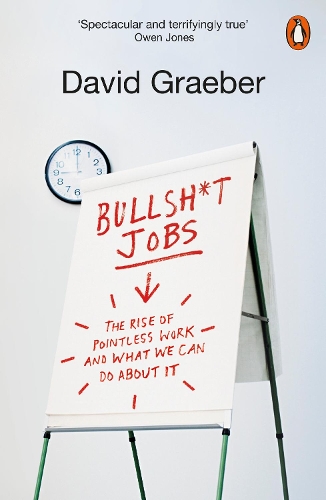
Bullshit Jobs: The Rise of Pointless Work, and What We Can Do About It
(Paperback)
Publishing Details
Bullshit Jobs: The Rise of Pointless Work, and What We Can Do About It
By (Author) David Graeber
Penguin Books Ltd
Penguin Books Ltd
19th February 2019
7th February 2019
United Kingdom
Classifications
General
Non Fiction
Working patterns and practices
Labour / income economics
Social, group or collective psychology
Sociology: work and labour
Impact of science and technology on society
Industrial relations, occupational health and safety
331
Physical Properties
Paperback
368
Width 129mm, Height 199mm, Spine 21mm
268g
Description
Huge swathes of people spend their days performing tasks they secretly believe are not really necessary. This book shows why, and what we can do about it Back in 1930, the economist John Maynard Keynes prophesied that by the century's end, technology would see us all working fifteen-hour weeks. But instead, something curious happened. Today, average working hours have not decreased, but increased. And now, across the developed world, three-quarters of all jobs are in services or admin, jobs that don't seem to add anything to society- bullshit jobs. In Bullshit Jobs, David Graeber explores how this phenomenon - one more associated with the 20th-century Soviet Union, but which capitalism was supposed to eliminate - has happened. In doing so, he looks at how we value work, and how, rather than being productive, work has become an end in itself; the way such work maintains the current broken system of finance capital; and, finally, how we can get out of it.
Reviews
Spectacular and terrifyingly true. David Graeber's theory of the broken capitalist workforce is right - work has become an end in itself. A timely book from the most provocative anthropologist and thinker of our time. -- Owen Jones
Equally explosive, my anarchist friend, David Graeber, yet again has thrown a hand grenade into the political economy debate with his Bullshit Jobs (Allen Lane), a call to strike out for freedom from meaningless work. -- John McDonnell * New Statesman, Books of the Year *
Here's a gift for a friend working in PR or HR. David Graeber's thesis is that they are working in"bullshit jobs". A bullshit job, he says, is one that its holder knows to be pointless or pernicious even though they must pretend otherwise. There are five sorts: flunkies (commissionaires, receptionists), goons (lobbyists, lawyers), duct tapers (who sort out problems others have created), box tickers, and taskmasters (management). It's a provocative case ... but you get the feeling he is on to something; there do seem to be a lot of pointless jobs in the modern economy -- Robbie Millen * The Times, Books of the Year *
Anthropologist David Graeber embarks on a provocative quest to find and explain the existence of countless mindless and pointless roles. He divides them into "flunkies", "goons", "duct-tapers", "box-tickers", and "taskmasters". It is an entertaining, if subjective study of a problem and an examination of potential answers, including a universal basic income. -- Andrew Hill * Financial Times, Business Book of the Year *
Anthropology professor and colourful anarchist David Graeber has opened a Pandora's box of the modern era by questioning the relevance of the swollen ranks of middle management and bullshit jobs that have cropped up across a variety of industries. A controversial but thought-provoking endeavour * City AM Book of the Year *
An LSE anthropologist with a track record of countering economic myths through a mix of anecdote, erudition, and political radicalism, Graeber is as good an analyst of the increasingly cowpatted field of modern employment as one could wish. And entertaining and thoroughly depressing read... it is extremely thought-provoking -- Tim Smith-Laing * Telegraph *
A provocative, funny and engaging book... that captures the imagination and deserves our attention * Financial Times *
Author Bio
David Graeber was a professor of anthropology at the London School of Economics. He is the author of The Dawn of Everything- A New History of Humanity, Debt- The First 5,000 Years and Bullshit Jobs- A Theory, and was a contributor to Harper's Magazine, The Guardian, and The Baffler. An iconic thinker and renowned activist, his early efforts helped to make Occupy Wall Street an era-defining movement. He died on 2 September 2020.
